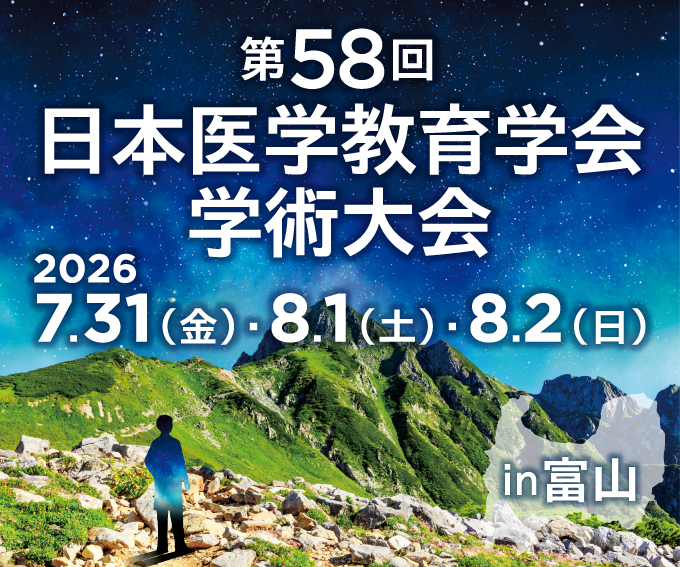学会誌
論文抄録
『医学教育』49巻・第3号【抄録】2018年06月25日
1. 序文:国際会議参加の意義
武田 裕子*
*学会誌編集委員長・順天堂大学医学部医学教育研究室
2. Ottawa Conference
松山 泰*1 西城 卓也*2
*1自治医科大学医学教育センター, Medical Education Center, Jichi Medical University
*2 岐阜大学医学教育開発研究センター,Medical Education Development Center, Gifu University
3. The Association for Medical Education in Europe (AMEE)
欧州医学教育学会
錦織 宏*
*京都大学大学院医学研究科医学教育・国際化推進センター,Medical Education Center, Graduate School of Medicine, Kyoto University
4. Asia Pacific Medical Education Conference(APMEC)
菊川 誠*
*九州大学大学院医学研究院医学教育学講座,School of Medicine Graduate School of Medical Sciences Faculty of Medical Sciences, Kyushu University
5. Asia-Pacific Conference on Problem Based Learning in Health Sciences and Higher Education (APC-PBL-HSHE)
アジア太平洋地区健康科学・高等教育でのPBL会議
松尾 理*
*近畿大学名誉教授,Kinki University Emeritus Professor
6. Association for the Study of Medical Education (ASME)
西城 卓也*
*岐阜大学医学教育開発研究センター, Gifu University Medical Education Development Center
7. The International Conference on Residency Education (ICRE)
西城 卓也*1 浅川 麻里*2 青野 真弓*3 今福 輪太郎*1
高山 祐一*4 鈴木 康之*1
*1 岐阜大学医学教育開発研究センター, Gifu University Medical Education Development Center
*2 堺市立総合医療センター総合内科, General Internal Medicine, Sakai City Medical Center
*3 聖路加国際病院教育センター, Medical Education Center, St Luke’s International Hospital
*4 大垣市民病院外科,Surgery, Ogaki Municipal Hospital
8. Association of American Medical College (AAMC)
青松 棟吉*1 高橋 誠*2
*1 佐久総合病院研修医教育科,Department of Medical Education, Saku Central Hospital
*2 東京医科歯科大学大学院医歯学総合研究科臨床医学教育開発学分野,Department of Medical Education Research and Development, Tokyo Medical and Dental University
地域医療現場からみた卒後臨床研修
日本医学教育学会 卒後・専門教育委員会
安井 浩樹*1 青松 棟吉*2 石原 慎*3 小西 靖彦*4
清水 貴子*5 高橋 弘明*6 高橋 誠*7 中川 晋*8 望月 篤*9
要旨:
地域医療研修は2004年に卒後臨床研修制度が開始されて以来,必修分野として現在に至っている.研修の現場は,へき地や遠隔地の診療所から市街の保健所まで多岐におよんでいる.地域医療研修を充実させ,よりよい研修医を育てるためには,プログラム責任者の役割が重要である.震災被災地での地域医療研修や,北海道と鹿児島の研修医の交換研修などユニークな研修も行われている.充実した地域医療研修は,地域でもとめられ世界的にも注目される,持続可能で新しい日本の保健医療システムをつくるための人材育成に不可欠である.
キーワード:卒後臨床研修,地域医療研修,プライマリ・ケア,多職種連携医療,保健医療改革
A perspective from the Community-Based Medicine
Japan Society for Medical Education, Post-graduate Medical Education Committee
Hiroki YASUI*1 Muneyoshi AOMATSU*2 Shin ISHIHARA*3
Yasuhiko KONISHI*4 Takako SHIMIZU*5 Hiroaki TAKAHASHI*6
Makoto TAKAHASHI*7 Susumu NAKAGAWA*8 Atsushi MOCHIZUKI*9
Abstract:
A community-based medicine program in the postgraduate clinical training system has been offered as a mandatory program since 2004. Training sites range from clinical attachments in rural/remote areas to public health centers in the city. The role of the program director is important for enhancing the community-based medical program and raising resident doctors. Unique training programs have been carried out, such as medical training in the afflicted area of the earthquake/Tsunami disaster area as well as an exchange program between Hokkaido and Kagoshima residents. The Japanese healthcare system is drawing global attention and local demand. Enrichment of the community-based medicine program is vital for the human resource development that makes the Japanese healthcare system innovative and sustainable.
Key words: postgraduate clinical training system, community-based medicine program, primary care, collaborative practice, healthcare innovation
*1 美幌町立国民健康保険病院呼吸器内科,National Insurance Bihoro Municipal Hospital [〒092-0015 北海道網走郡美幌町仲町2−38]
*2 佐久総合病院研修医教育科,Department of Medical Education, Saku Central Hospital
*3 藤田保健衛生大学地域医療学,Department of Community Medicine, Fujita Health University
*4 京都大学医学教育・国際化推進センター,Medical Education Center, Kyoto University
*5 聖隷福祉事業団,Seirei Social Welfare Community
*6 岩手県立中央病院医療研修部,Department of Medical Education, Iwate Prefectural Central Hospital
*7 東京医科歯科大学臨床医学教育開発学,Department of Medical Education
Research and Development, Tokyo Medical and Dental University
*8 東京都済生会中央病院人材育成センター,Center for Human Resource Development, Tokyo Saiseikai Central Hospital
*9 聖マリアンナ医科大学医学教育文化部門医学教育研究分野,Research Institute for Medical Education, St. Marianna University School of Medicine
受付:2018年5月23日,受理:2018年5月25日
須郷 広之* 関根 悠貴* 市川 亮介* 宮野 省三*
渡野邉 郁雄* 町田 理夫* 北畠 俊顕* 李 慶文* 児島 邦明*
要旨:
目的:研修医の「学会発表」に対する意識や捉え方を調査・評価する.
方法:学会発表を経験した研修医22名にアンケート調査を実施した.
結果:回答率は68%(15名)で,87%(13名)が初めての学会発表であった.93%(14名)が学会発表経験を「いい経験」とポジティブに捉え,80%(12名)が「また発表したい」と回答した.一方で学会発表の応否について研修医による自己決定を要望する意見もみられた.
考察:研修医にとって学会発表は有意義な経験であった.今回の調査から今後の指導では「なぜ発表は必要なのか?」「なにが得られるのか?」といった事前説明による内発的動機づけと自己決定の機会が重要と思われた.
キーワード:卒後教育, 学会発表, 内発的動機づけ
Hiroyuki SUGO* Yuki SEKINE* Ryosuke ICHIKAWA*
Shozo MIYANO* Ikuo WATANOBE* Michio MACHIDA*
Toshiaki KITABATAKE* Yoshifumi LEE* Kuniaki KOJIMA*
Abstract:
Introduction: Conference presentations are a very instructive experience for doctors.
Aim: The aim of this study was to evaluate residents' attitude toward conference presentations.
Methods: A questionnaire-based survey was conducted on 22 residents at our hospital, regarding their experience with giving a conference presentation.
Results: Of the 22 residents, 15 (68%) completed the questionnaires. 13 (87%) of them had experienced giving a presentation for the first time. Overall, 14 (93%) of the 15 residents thought the experience of giving a conference presentation was very instructive. 12 residents (80%) wanted to experience it again. On the other hand, a few residents requested that giving a presentation be made voluntary and not mandatory.
Conclusion: The results of our study demonstrates that giving conference presentations would be a very valuable experience for young doctors. The experience of giving a presentation coupled with prior explanations about its instructive value could positively impact intrinsic motivation.
Key words: postgraduate education, conference presentations, intrinsic motivation
*順天堂大学医学部附属練馬病院総合外科, Department of General Surgery, Juntendo University Nerima Hospital
受付:2017年12月11日,受理:2018年6月7日
災害直後の「支援」と「受援」を考える
アクティブ・ラーニング
武田 多一*1 永石 妙美*2 大野 直子*3 武田 裕子*4
要旨:
大規模自然災害に遭遇したという事例をもとに,アクティブ・ラーニングを実施した.遠隔地の大学合宿所における被災という身近な設定で,さまざまな立場の参加者が,それまでの経験や知識を共有し,理解を構築するというシナリオを用いた.災害対応を支援する側だけでなく,支援を受ける受援の側の立場での討議も行った.
キーワード: 災害医療,受援,アクティブ・ラーニング,シミュレーション
active learning on roles of rescuers and sufferers
Taichi TAKEDA*1 Taemi NAGAISHI*2 Naoko ONO*3
Yuko TAKEDA*4
Abstract:
We have conducted an active learning session for participants in various fields using a scenario that university students encountered a great earthquake during their field trip. The program was unique in providing participants opportunity to simulate not only providing support but also receiving the support.
Key words:disaster medicine, disaster relief, active learning, simulation
*1 三重大学医学部附属病院災害医療センター,三重大学地域圏防災減災研究センター災害医療部門,Center for Disaster Medicine Mie University Hospital,Disaster Mitigation Research Center, Mie University
*2 横浜市立大学医学部4年,Yokohama City University School of Medicine
*3 順天堂大学国際教養学部,Juntendo University Faculty of International Liberal Arts
*4 順天堂大学医学部医学教育研究室,Juntendo University Faculty of Medicine
時代は変わる―地域で苦闘した12年間
松村 真司*
はじめに
懸田賞を頂いたのは相当昔の事.今回,編集部からこのエッセイのお話しを頂いたときにはそんな気持ちでいたが,資料によると私が受賞したのは平成18年度なので12年前,ちょうど干支一回り程度である.ただ自分としてはこの12年間,特にその後半の6年間は苦しみもがきながら地域の活動を続けた日々であったので,実際以上に月日の流れを長く感じているようにも思う.受賞当時のことを思い返してみると,開業医として多忙な日々の中,当初参加しない方向で考えていた学術大会だったが,せっかく賞を頂いたのでなんとか時間を捻出して受賞式にだけトンボ返りで参加したことを覚えている.そんなわけで,受賞式の記憶はほとんどないのだが,帰ろうとしたところに丁度到着された日野原重明先生とばったり会って,「大変だろうが,これからも頑張って」と励ましていただいたことだけをかすかに覚えている.
編集部からの依頼によるとこのリレー・エッセイは「懸田賞を受賞した論文について,受賞後の自身の研究,教育実践についてなど,自由にご執筆する」との趣旨で行われているとのことであった.自分としては,医学教育研究においても,教育実践の分野においてもその後はあまり貢献をしていないので,いったんお断りしようと思ったのだが,バトンを渡していただいた旧知の高屋敷明由美先生からのご推薦なので,思い切って引き受けることにした.地域の診療を志していたかつての自分が,どのような経緯で医学教育に関わるようになり,その後どのような足跡を歩んできたのかを省みることで,今後の若手の教育研究・実践者,特に大学・医育機関に所属せず地域で活動を続ける医師にとって,何らかのメッセージが少しでも伝われば幸いである.
*松村医院,Matsumura Family Clinic
岐阜大学 医学教育開発研究センター 川上 ちひろ
信州大学医学部 医学教育研修センター 多田 剛
野田 莉香子*1 久野 真弘*1 宮川 紫乃*2
*1 慶應義塾大学医学部6年,Medical student, Keio University School of Medicine
*2 慶應義塾大学研修医,Resident, Keio University Hospital
中村 千賀子
蓮沼 直子*
*秋田大学医学部総合地域医療推進学講座
模擬症例カンファレンスを応用させた臨床推論の学生評価」を読んで
北村 匡大*
*小倉リハビリテーション学院理学療法学科




